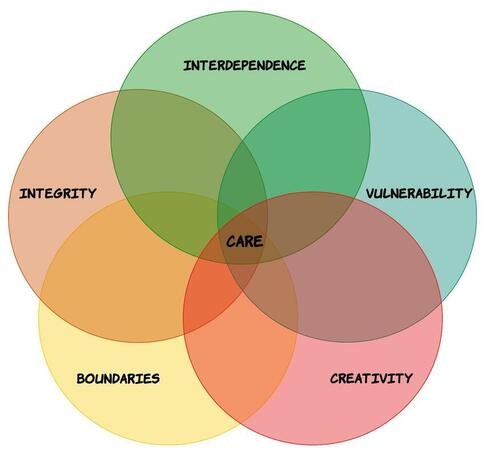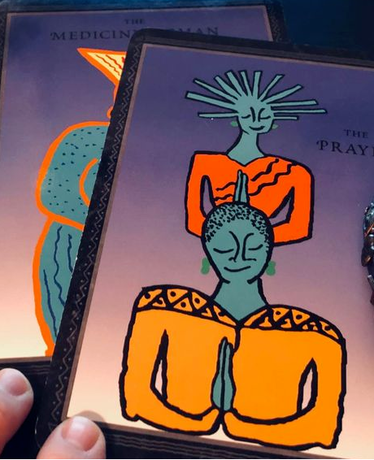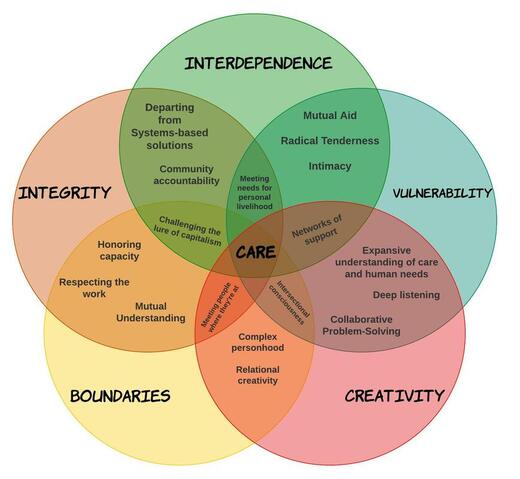"Our movements themselves have to be healing, or there's no point to them." -Cara Page, Kindred: Southern Healing Justice Collective
What is "care work"?

I draw from the rich history of feminist, womanist, trans, queer, BIPOC, and disability movements to describe "care work." Garnered from the struggle and wisdom of these movements, care work is informed by five overlapping principles: interdependence, vulnerability, creativity, boundaries, and integrity. This care model was first articulated and used by practicing care witch, Galen Smith and through conversations with Galen and other care witches/ care workers, I (re)organized and (re)imagined for my own use in the model below.
The Five Principles of careInterdependence - This principle recognizes the interconnectivity of all life--human and non-human--and our interdependence with each other and the Earth. Interdependence promotes mutual aid and emphasizes the importance of community connectedness. Within the context of relationships, interdependence recgonizes the needs of all people in the care relationship and strives to harmonize these needs. Care workers operate in ways that promote and affirm our interdependence. In practice, that looks like building networks of care workers in a climate of non-competition and common vision for the community; departing from harmful systems as solutions for our communities' needs; redistributing skills, time, energy, attention, and other forms of intangible or immaterial privileges; challenging toxic relational patterns in intimacy and offering care relationships grounded in mutual respect, tenderness, and courageous compassion.
Vulnerability - Describes individual qualities of openness, candidacy, and tenderness; the experience of emotional, spiritual, and/or physical intimacy with self and others; the giving and receiving tender loving care of the bodymindspirit. In practice, vulnerability may look like co-regulation exercises (e.g.: breathing, acupressure, visualization); practicing deep listening and holding without judgement; bravely and courageously affirming individual well-being; guiding and supporting people as they seek to build or repair their relationships with self, others, and the Earth. These practices are gleaned from the individuals' own needs and melded with the skills and capacity of the care worker. Together, they explore the needs and how to meet them in an open and transparent manner. Creativity - The principle of creativity is rooted in marginalized people's creativity energy wrought by necessity and survival. People have diverse needs and creative strategies are often needed to help meet our needs when dominant systems are set up with the intention to do harm or fail us. Care workers actively strive to build more healing, restorative, and sustainable lifeways. Creativity allows us to envision more socially just futures that diverge from harmful patterns and try approaches that acknowledge our complexity and humanity. In the creative spirit, we can surrender judgements about ourselves and sit in the joy of creation and expression as we explore enjoy a hobby, appreciate the cycle of nature, or learn something new. Outside of individual practices, we can think creatively about relationship structures and building community to meet our needs for care. Being creative encourages us to ask what we might need from our primary relationships and exploring what lies beyond our current definitions of friendship or partnership. Together, we can tap into that creative spark and start envisioning what we need to feel whole. OFFERINGS |
Boundaries - Boundaries can be described at the space where one individual ends and another begins. In marking this space, boundaries honor the self and promote balance between individual needs and the needs of the larger collective. Honoring, recognizing, and identifying our boundaries help us understand our limits as well as be receptive to the limits of others. Boundaries work in tandem with other care work principles to avoid the lure of oppressive and extractice patterns (e.g.: white savior complex, enmeshment, exploitation) that contribute to the devaluation of care and disposability of care workers. Historically, care work often consisted of the unseen, undervalued labor of particularly women of color. Naming "care" as a form of work elevates the appreciation and value of this essential, life-giving labor and encourages others to recognize the value of care in their own lives. Thus, I name "care work" as a form of labor to challenge the racist, sexist, and classist underpinnings that actively devalue "care work." In tandem with interdependence, boundaries safeguard care workers livelihood while recognizing that "care" is essential to our collective well-being.
Integrity - Care work is vulnerable work and therefore, must be executed with deep integrity and ethical practice. Care work must be navigating using a strong moral compass, squarely positioned in anti-oppressionist values. Care workers must actively seek to prevent harm to self and others. In collaboration with strong boundaries, practicing integrity encourages care workers to respect their individual capacity, collaboratively define mutual understandings of the work, and prepare avenues accountability should harm occur. Thus, care work always happens in the context of community and accountability to our vow of integrity is a commual and individual practice. The network of care workers developed through the practice of interdependence can assist with resolving conflicts, addressing harm, and promote restoration, reparation, and healing moving forward. |
 Deep listening circles are grounded in collaborative healing practices and social justice principles.
Deep listening circles are grounded in collaborative healing practices and social justice principles.
Guest Lectures
I hold advanced degrees in Sociology/Criminal Justice and Gender, Sexuality, and Women's Studies and have over 12 years experience teaching in higher education. As a former professor, I delight in connecting with diverse learning audiences and enjoy facilitating the magic of learning. I offer interactive lectures and workshops focused on my areas of expertise. Beyond topics related to care art, I feel comfortable lecturing on the following topics:
1.) Art as modes of resistance, empowerment, healing, and community building (e.g.: feminist/queer/trans zines)
2.) Disability justice and DIY publishing (e.g.: my work with GlitterWurst Zine Distro)
3.) Topics related to trans/queer politics and hirstories (e.g.: trans activism, trans archives, the politics of fat, queer, and trans visibility)
4.) Trauma-responsive work (e.g.: trauma 101; enhancing care for victims/survivors of sexual assault; what does it mean to be trauma-responsive in lieu of "trauma-informed"?)
5.) Queer disabled/"crip" pedagogies and disability justice for professionals (e.g.: creating your disability justice statement, exploring access vs. accomodation in your class/organization).
Deep Listening Circles
Deep listening circles are community-oriented, group listening practices rooted in mindfulness and social justice principles. Deep listening is intended to build individual and collective power by appreciating individuals' complex personhood and practicing receiving that deep perception from fellow group members.[1] Mindfulnes practices are structured to simply draw attention to something without attempting to alter the present moment. Thus, deep listening circles can be considered a form of presence meditation, sitting with the words, feelings, and experiences shared by each member of the group and in turn, experience the healing of being fully heard. Offered in single sessions or in short series of sessions. [Minimum number of 3 individuals, 45 minute practice]
Care Art Circles
Care Art Circles are a customizeable, community-oriented, and trauma-informed creative practices grounded in mindfulness, somatic awareness, and mutual support. Circle work melds the personal and collective experiencing to explore difficult feelings, process energy blockages, and locate personal power. Participants use creative mediums (e.g.: pastels, collage, finger paints) to sit with, appreciate, and experience the difficult feeling in a safer way. Art can also be used as a safer way to experience and witness others' pain in a discrete and external location, allowing individual participants to feel fully seen, validated, and heard. Finally, art can offer participants techniques to slow the body down, identify blockages, and attend to our emotional/physical/spiritual needs. Anyone can make art! No prior experience required to participate. Offered in single sessions or in series of sessions. [Minimum 3 participants, 1.25 hour minimum]
I hold advanced degrees in Sociology/Criminal Justice and Gender, Sexuality, and Women's Studies and have over 12 years experience teaching in higher education. As a former professor, I delight in connecting with diverse learning audiences and enjoy facilitating the magic of learning. I offer interactive lectures and workshops focused on my areas of expertise. Beyond topics related to care art, I feel comfortable lecturing on the following topics:
1.) Art as modes of resistance, empowerment, healing, and community building (e.g.: feminist/queer/trans zines)
2.) Disability justice and DIY publishing (e.g.: my work with GlitterWurst Zine Distro)
3.) Topics related to trans/queer politics and hirstories (e.g.: trans activism, trans archives, the politics of fat, queer, and trans visibility)
4.) Trauma-responsive work (e.g.: trauma 101; enhancing care for victims/survivors of sexual assault; what does it mean to be trauma-responsive in lieu of "trauma-informed"?)
5.) Queer disabled/"crip" pedagogies and disability justice for professionals (e.g.: creating your disability justice statement, exploring access vs. accomodation in your class/organization).
Deep Listening Circles
Deep listening circles are community-oriented, group listening practices rooted in mindfulness and social justice principles. Deep listening is intended to build individual and collective power by appreciating individuals' complex personhood and practicing receiving that deep perception from fellow group members.[1] Mindfulnes practices are structured to simply draw attention to something without attempting to alter the present moment. Thus, deep listening circles can be considered a form of presence meditation, sitting with the words, feelings, and experiences shared by each member of the group and in turn, experience the healing of being fully heard. Offered in single sessions or in short series of sessions. [Minimum number of 3 individuals, 45 minute practice]
Care Art Circles
Care Art Circles are a customizeable, community-oriented, and trauma-informed creative practices grounded in mindfulness, somatic awareness, and mutual support. Circle work melds the personal and collective experiencing to explore difficult feelings, process energy blockages, and locate personal power. Participants use creative mediums (e.g.: pastels, collage, finger paints) to sit with, appreciate, and experience the difficult feeling in a safer way. Art can also be used as a safer way to experience and witness others' pain in a discrete and external location, allowing individual participants to feel fully seen, validated, and heard. Finally, art can offer participants techniques to slow the body down, identify blockages, and attend to our emotional/physical/spiritual needs. Anyone can make art! No prior experience required to participate. Offered in single sessions or in series of sessions. [Minimum 3 participants, 1.25 hour minimum]
 Image by Sam Schmitt, featuring the Black Angel Oracle Card set by Zenju Earthlyn Manuel.
Image by Sam Schmitt, featuring the Black Angel Oracle Card set by Zenju Earthlyn Manuel.
Customized Care Support
I offer individualized, short-term care services to provide emotional, creative, and/or spiritual support. Each individual's are different and my strengths include creative self-expression, body/mind/spirit awareness, and deep listening strategies. I may be a good fit for you if you're looking for opportunities to feel more aware of and connected to your body; looking for structured opportunities to be still and present in the moment; seeking a safer place to share difficult feelings and have them mirrored back without judgement; wanting to feel more connected to the Earth or have spiritual practices guide the care session; or are feeling curious about
how to use art to feel better attuned to your feelings and your body's needs.
Practically, these forms of care may include listening sessions, individual care art work, tarot card readings/oracle cards, guided mediation, breath work, guided somatic/body awareness, light in-person bodywork (e.g.: accupressure), or guided movement to shift energy blockages. I'm happy to offer prospective clients a brief zoom consultation to learn more about me, my values and practices, and see if working together would be a good fit for both of us.
[1] - Term adapted by womanist pedagogies as defined in AnaLouise Keating's Teaching Transformation: Transcultural Classroom Dialogues. Palgrave Macmillian: 2007. Print.
I offer individualized, short-term care services to provide emotional, creative, and/or spiritual support. Each individual's are different and my strengths include creative self-expression, body/mind/spirit awareness, and deep listening strategies. I may be a good fit for you if you're looking for opportunities to feel more aware of and connected to your body; looking for structured opportunities to be still and present in the moment; seeking a safer place to share difficult feelings and have them mirrored back without judgement; wanting to feel more connected to the Earth or have spiritual practices guide the care session; or are feeling curious about
how to use art to feel better attuned to your feelings and your body's needs.
Practically, these forms of care may include listening sessions, individual care art work, tarot card readings/oracle cards, guided mediation, breath work, guided somatic/body awareness, light in-person bodywork (e.g.: accupressure), or guided movement to shift energy blockages. I'm happy to offer prospective clients a brief zoom consultation to learn more about me, my values and practices, and see if working together would be a good fit for both of us.
[1] - Term adapted by womanist pedagogies as defined in AnaLouise Keating's Teaching Transformation: Transcultural Classroom Dialogues. Palgrave Macmillian: 2007. Print.
Proudly powered by Weebly
